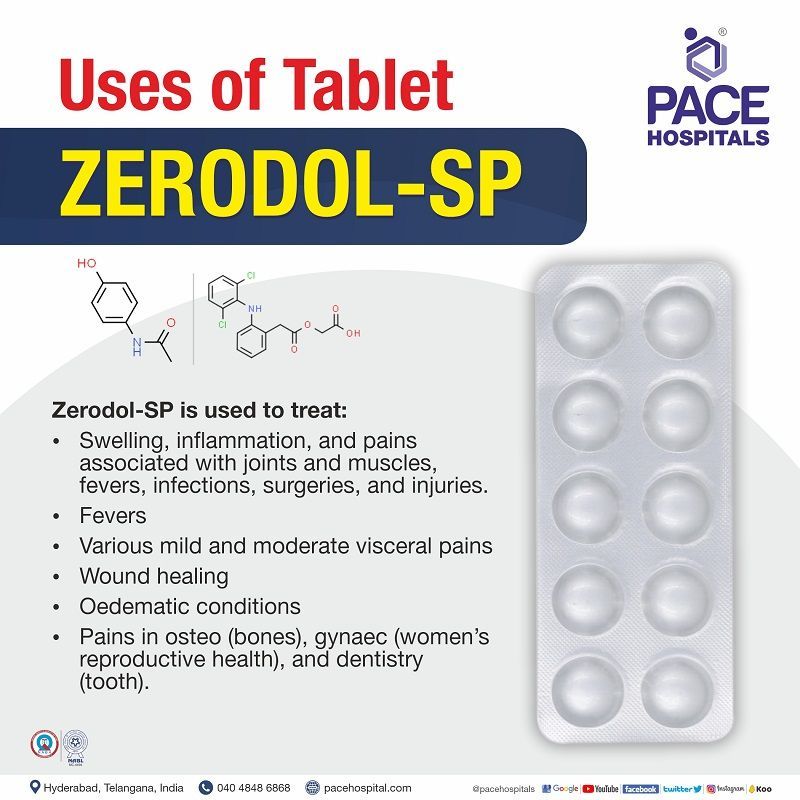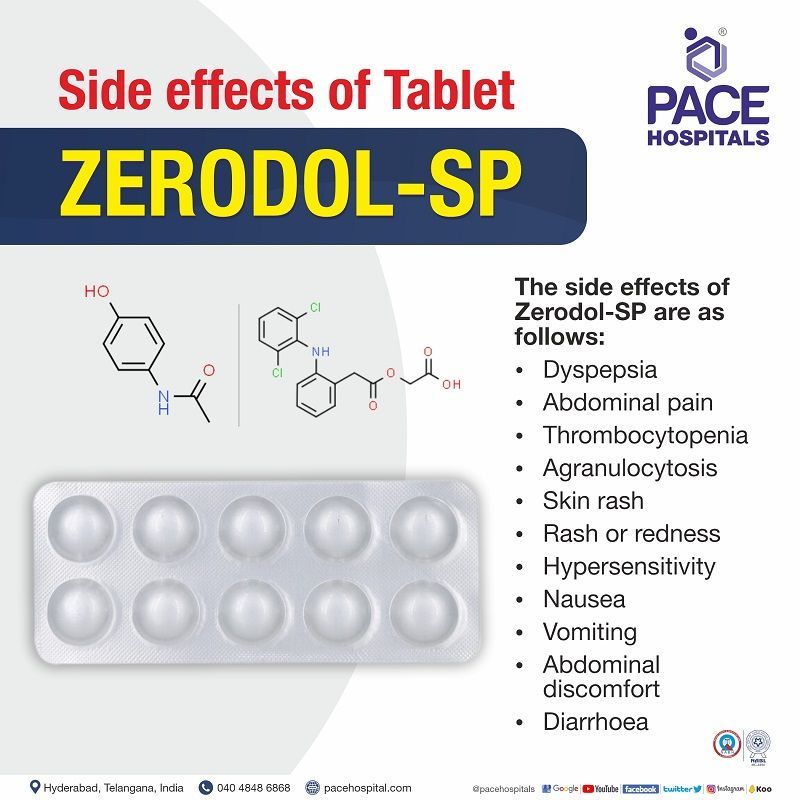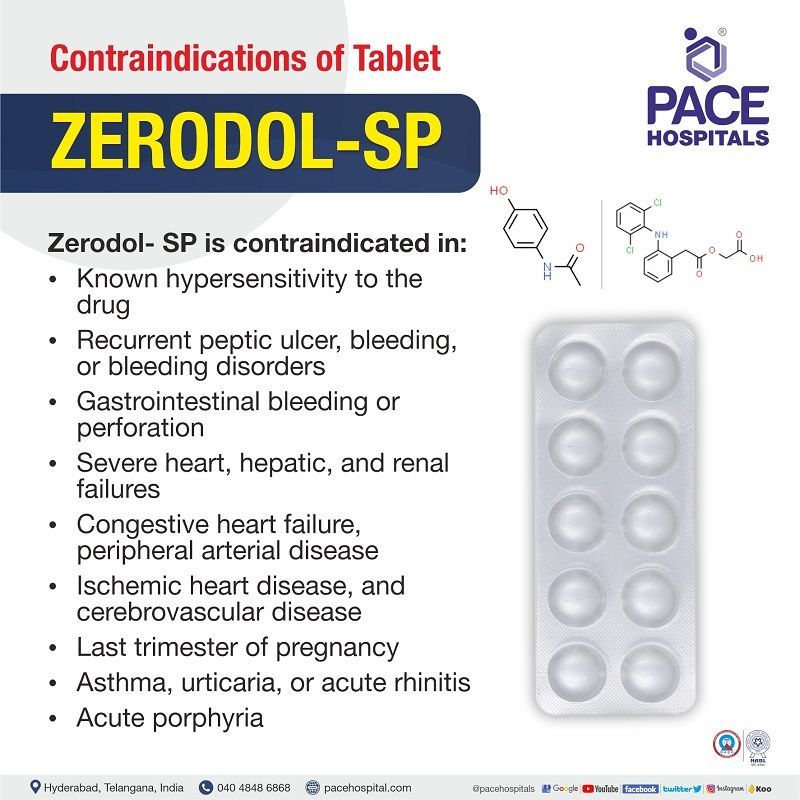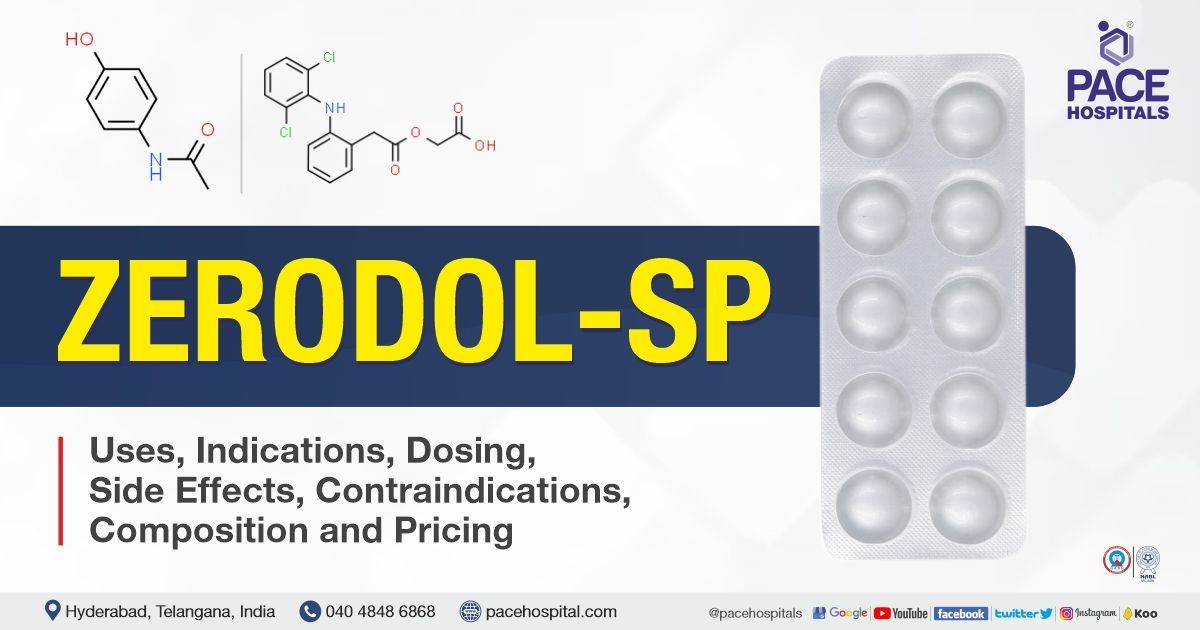Zerodol SP - Uses, Side Effects, Composition, Indications and Price
PACE Hospitals
Zerodol SP tablet contains a combination of aceclofenac, paracetamol, and serratiopeptidase, commonly prescribed to treat inflammation, swelling, and pain from various illnesses.
It can be used to treat several kinds of mild to moderate visceral pains, and the healing process appears to be progressing more quickly.
Overview of Zerodol SP
- Zerodol SP tablet contains the combination of aceclofenac, paracetamol, and serratiopeptidase, which comes under the category of NSAID’s (non-steroidal anti-inflammatory drugs; reduces swelling), analgesic (pain relieving), and proteolytic enzyme respectively.
- Zerodol SP tablet is manufactured and marketed by Ipca Laboratories Limited.
- Zerodol SP is used to treat the swelling, inflammation, and fever conditions associated with infections, trauma, surgeries, and other visceral pains, which are mild to moderate.
- Zerodol SP is not only used for swelling and inflammation but also makes the healing process faster.
Zerodol SP Tablet Uses
Zerodol SP used for treating various conditions such as swelling, inflammation, and pains which are induced due to fever, injury, infections, and various surgeries. It is also used to treat multiple visceral pains, which are mild and moderate. Despite this, it shows quicker action in the healing process. It is also used to treat oedematic (too much fluid in the body tissues) conditions.

General considerations to follow while taking Zerodol SP tablet
- Adults may take one pill twice daily.
- Zerodol- sp tablets should ideally be taken two hours after a meal.
- The tablet should be taken with a glass full of water and should not be crushed or chewed.
- The maximum dose of aceclofenac advised is 200 mg daily in divided doses.
- The maximum amount of paracetamol that should be taken daily in divided doses is 4 g.
- Serratiopeptidase can be used up to 60 milligrams per day or as directed by a medical professional.
- Avoid drug administration in case of any hyperreaction (the body reacts to the drug, which could induce mild to severe immune-mediated reactions) which include rash, anaphylaxis, and serum sickness).
- Take it in regular time intervals daily to get a better result.
- Do not take two doses at the same time, as it leads to adverse events.
- In case of a missed dose (due to forgetfulness etc.), the next dose must be taken immediately as and when it is remembered, but if it is close to the next dosing schedule, skip it and go for the next dose.
- Follow the treatment chart as directed by the physician.
Zerodol-SP Mechanism of Action
The mechanism of action of individual drugs which are involved in Zerodol-SP are as follows:
Aceclofenac:
- The mechanism of action of aceclofenac involves inhibiting cyclooxygenase enzymes (COX), which are responsible for converting arachidonic acid into prostaglandins, producing analgesic and anti-inflammatory effects.
- Prostaglandins are chemical compounds which cause pain, inflammation, and fever.
Paracetamol: Paracetamol usually shows both analgesic and antipyretic effects:
- Analgesic effect: paracetamol inhibits prostaglandin synthesis through peripheral action by blocking the pain impulse. The peripheral action is due to the inhibition of prostaglandins which are responsible for sensitising the pain receptors.
- Antipyretic effect: paracetamol induces an antipyretic effect by acting on the hypothalamic heat regulation centre, causing vasodilation and improving blood flow through the skin, sweating and heat loss.
Serratiopeptidase: Serratiopeptidase shows anti-inflammatory, analgesic, and anti-oedemic effects, respectively.
- Anti-inflammatory: serratiopeptidase hydrolyses inflammatory mediators such as bradykinin, histamine, and serotonin.
- Analgesic: serratiopeptidase decreases pain by inhibiting the bradykinin (pain-inducing amine).
- Anti-oedemic effect: By thinning the fluid, decreasing the amount present in the tissues, and permitting fluid removal, serratiopeptidase lowers oedema. Additionally, serratiopeptidase enzyme activity breaks down dead tissue surrounding the wounded location to speed up the healing procedure.
Zerodol SP Indications
Zerodol-SP is used to treat:
- Swelling, inflammation, and pains associated with joints and muscles, fevers, infections, surgeries, and injuries.
- Fevers
- Various mild and moderate visceral pains
- Wound healing
- Oedematic conditions
- Pains in osteo (bones), gynaec (women’s reproductive health), and dentistry (tooth).
Zerodol SP Dosage
Dosage forms & strengths of Zerodol-SP:
It is available in tablet form. Each film-coated tablet contains the following:
- Aceclofenac IP 100 mg
- Paracetamol IP 325 mg.
- Serratiopeptidase IP 15 mg.
(As enteric coated granules equivalent to enzyme activity 30,000 Units)
Excipients: q.s.
Zerodol-SP dosage for adults:
- One tablet of Zerodol-SP is advised twice daily.
Note: no dosing data were established for paediatrics.
Zerodol-SP dosage for geriatrics:
- In normal renal and hepatic functioning elderly patients, Zerodol-SP content may be taken as usual as adults with caution as prescribed by the physician.
Disclaimer: The dosing information (doses, dosages frequency, and everything connected) provided here is compiled from accurate trusted sources. Nevertheless, we can neither guarantee its accuracy nor be responsible for any updation. We do not encourage self-medication. The treating physician retains the medical discretion of administering or discontinuing the drug.

Zerodol SP Side Effects
Zerodol-SP tablet is generally safe, and it doesn’t cause any side effects. However, in some cases, it can cause some side effects based on the combinations, including:
Aceclofenac:
Common side effects of aceclofenac:
- Dyspepsia (indigestion)
- Abdominal pain
- Nausea (vomiting sensation)
- Diarrhoea (loose stools)
- Dizziness (lightheaded/altered sense of balance)
- Increased levels of hepatic enzymes (confirmation tests responsible for liver function)
Rare side effects of aceclofenac:
- Granulocytopenia (decrease in the specific type of white blood cells known as granulocytes)
- Thrombocytopenia (decreased platelet count)
- Neutropenia (decreased neutrophil count)
- Haemolytic anaemia (anaemia caused due to death of red blood cells)
- Depression
- Vertigo (spinning sensation caused by a moving head)
- Hepatitis (inflammation of the liver)
- Oedema (swelling due to excess fluid in tissues)
Paracetamol:
Side effects of paracetamol are rare. The reports have shown a few rare side effects, such as
- Blood dyscrasias (an imbalance of blood, bile, lymph, and phlegm)
- Thrombocytopenic purpura (formation of blood clots throughout the body)
- Methemoglobinemia (decreased oxygen-carrying capacity)
- Agranulocytosis (decrease in the specific type of white blood cells known as granulocytes)
- Skin rash
- Anaphylactic reaction (severe allergic reaction)
Serratiopeptidase:
- Rash or redness
- Hypersensitivity
- Muscle and joint pain
- Anorexia (eating disorder with low weight, characterized by fear of gaining weight)
- Nausea
- Vomiting
- Abdominal discomfort
- Diarrhoea (loose stools)
- Cough
- Epistaxis (nosebleed)
- Haemoptysis (small amounts of blood mixed with sputum)
Note: If you experience any serious side effects as mentioned above or with any severe reaction, immediately seek medical attention by visiting the hospital or physician.

Zerodol SP Contraindications
Zerodol-SP is contraindicated in:
- Known hypersensitivity to aceclofenac, paracetamol, serratiopeptidase, or any component of the formulation.
- Active or history of recurrent peptic ulcer, bleeding, or bleeding disorders.
- History of gastrointestinal (GI) bleeding or perforation (hole to GI mucosa) relating to previous NSAID therapy.
- Severe heart, hepatic (liver), and renal (kidney) failure.
- Patients with confirmed congestive heart failure (NYHA class II-IV), peripheral arterial disease, ischaemic heart disease, and cerebrovascular disease.
- During the last trimester (last three months) of pregnancy.
- Patients with asthma, urticaria (skin rash), or acute rhinitis (runny or watery nose) are precipitated by aspirin or other non-steroidal anti-inflammatory drugs (NSAID’s).
- Acute porphyria. (Build-up of natural chemicals called porphyrins)
Effect of Zerodol-SP Use in Specific Populations
Zerodol-SP in pregnancy:
There are no established studies on pregnant women regarding the Zerodol-SP combination drugs. However, studies have stated that the use of NSAID's in the last trimester of pregnant women decreases uterine contractions.
Zerodol-SP in nursing women:
There is no information on the secretion of aceclofenac and serratiopeptidase in breast milk. However, some studies have shown a small amount of paracetamol in breast milk. The decision on advising this medication by a physician depends on the patient's condition.
Zerodol-SP in paediatric patients:
Safety and efficacy need to be better established in paediatric patients. Therefore, it is not recommended for paediatric patients.
Zerodol-SP in geriatric patients:
It is usually recommended for healthy elderly patients and not recommended in severe renal, hepatic, and GI disorder patients.
Zerodol-SP in renal impairment patients:
Paracetamol is usually excreted through the renal route, thereby contraindicated in renal patients.
Zerodol-SP in hepatic impairment patients:
NSAID's induces liver toxicity in hepatic patients, and thereby it is contraindicated in hepatic impairment patients.
Zerodol-SP during driving and operating machinery:
Zerodol-SP is having undesirable effects such as dizziness, drowsiness, and vertigo, and thereby it is not recommended in such cases.
Zerodol-SP Drug Interactions
A drug interaction is a reaction between two or more drugs, food, or supplements leading to the undesired reaction.
When Zerodol-SP is given with various drugs, a wide range of effects could be expected. Zerodol-SP interactions are:
Aceclofenac:
- +Lithium: Aceclofenac, like many NSAID’s may raise the plasma concentration of lithium, which increases the likelihood of a hazardous effect.
- +Digoxin: By affecting the kidneys, NSAID’s might worsen heart failure, raise plasma levels of cardiac glycosides, and lower the glomerular filtration rate (GFR) in individuals taking cardiac glycosides.
- +Diuretics: Aceclofenac, like other NSAID’s, may prevent diuretics from working as indicated. Although interactions with other diuretics cannot be ruled out, when provided with bendrofluazide, it wasn't shown to have an impact on blood pressure regulation. Serum potassium should be monitored when potassium-sparing diuretics are used concurrently. Diuretics can raise the danger of NSAID nephrotoxicity.
- +Anti coagulants (blood thinners): aceclofenac enhances the blood thinner activity. Thereby monitoring is needed when given.
- +Methotrexate: If NSAIDs and methotrexate are delivered within 24 hours of one another, caution should be taken since NSAIDs may raise plasma levels and increase toxicity.
- +Mifepristone: NSAIDs should not be used for 8 to 12 days following the delivery of mifepristone because NSAIDs may reduce mifepristone's effects.
- +Corticosteroids: Aceclofenac and corticosteroids should not be administered concurrently because this may raise the risk of GI bleeding or ulcers.
- +Anti-platelet agents: Combining aceclofenac with antiplatelet agents or selective serotonin reuptake inhibitors (SSRIs) may increase the risk of gastrointestinal bleeding.
- +Cyclosporine: The effect of NSAIDs on renal prostaglandins may make cyclosporine more toxic to the kidneys.
- + Quinolone antimicrobials: Quinolones and NSAIDs may interact, resulting in convulsions. Patients with or without prior medical history may experience it.
Paracetamol:
- +Cholestyramine: Cholestyramine slows down the rate at which paracetamol is absorbed. Therefore, if maximum analgesia is necessary, cholestyramine shouldn't be given within an hour.
- +Domperidone with metoclopramide: The absorption of paracetamol is enhanced by domperidone with metoclopramide.
- + Warfarin: Prolonged, frequent use of paracetamol may increase the anticoagulant effect of warfarin and other coumarins, with an increased risk of bleeding; intermitent doses have little or no effect.
- + Chloramphenicol: Combining paracetamol and chloramphenicol may significantly slow down the drug's elimination, raising the drug's plasma concentration and the possibility of negative side effects. Combining paracetamol and chloramphenicol injection is advised. However, monitoring of chloramphenicol plasma levels is also recommended.
- + Isoniazid, alcohol, and anticonvulsants: Administering these substances increases hepatotoxicity (liver toxicity).
Serratiopeptidase:
- + Anticoagulant/Antiplatelet Drugs: When taken with aspirin, warfarin, or clopidogrel, wound up or bleeding risk could be raised.
- + Natural substances: Serratiopeptidase may enhance the risk of bleeding or bruising when used with certain natural substances/ organic ingredients like fish oil, turmeric, and garlic.
Note: On discussion with your physician, they may advise you to avoid or take an alternative drug or maintain a time gap if any of the above-prescribed medicines are to be taken together.
Zerodol SP Price in India
Maximum retail price as per year 2023: ₹ 118.30 (each strip contains ten tablets). Zerodol SP tablet is manufactured by Ipca Laboratories Ltd and available at mostly each and every pharmacy.
Frequently Asked Questions (FAQs) on Zerodol SP
Share on
Request an appointment
Fill in the appointment form or call us instantly to book a confirmed appointment with our super specialist at 04048486868
Appointment request - health articles
Recent Articles











